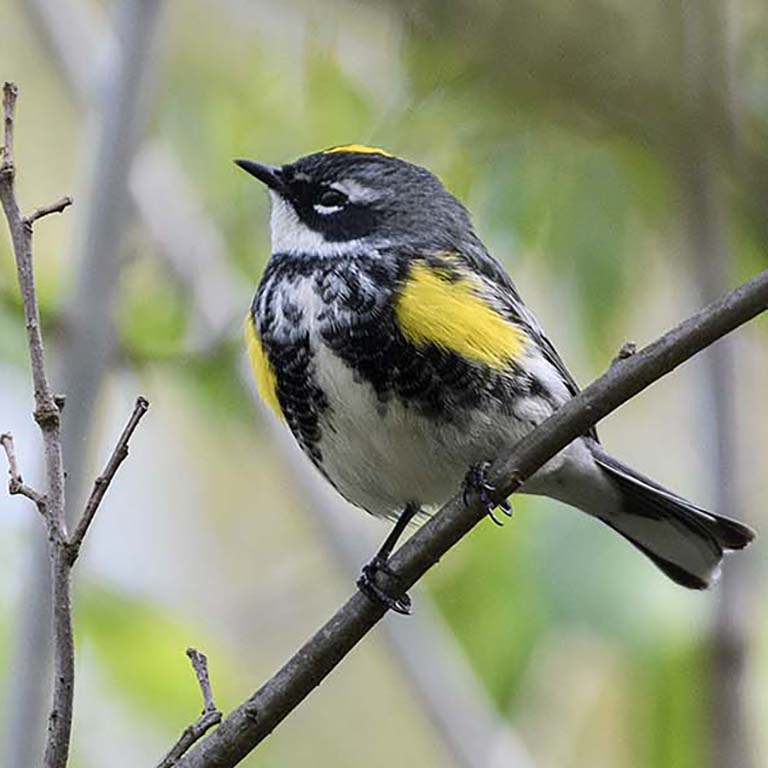In a rapidly changing climate, the newly launched Midwest Center for Biodiversity, within the College of Arts and Sciences at Indiana University Bloomington, will be the first center dedicated to studying why the Midwest is losing biodiversity. The center will recommend solutions in conservation practice and policy, and increase awareness of the urgent response needed to stop this loss.
The Midwest Center for Biodiversity is co-directed by Ellen Ketterson, a Distinguished Professor of Biology in the College, and Alex Jahn, a research scientist with the College's Department of Biology.
Located at Kent Farm, part of IU’s Research and Teaching Preserve, the center will feature several key areas of research, including:
- Plant community ecology and plant diversity.
- The role of forests in carbon sequestration.
- Insects as prey and pollinators.
- The adaptive capacities of an array of organisms.
- Water’s role in preserving biodiversity.
- Conservation law.
- Birds, especially migratory birds.
Through its research, the center will leverage the depth and breadth of expertise at IU and increase crossover between related fields and departments in pursuit of research.
The center will collaborate with the IU Environmental Resilience Institute, Conservation Law Center, and Center for the Integrative Study of Animal Behavior and take advantage of the wealth of experts across these IU programs to enhance research efforts. Faculty involved with the center are in multiple schools and departments, including the College of Arts and Sciences; the Luddy School of Informatics, Computing and Engineering; The Media School; the O’Neill School of Public and Environmental Affairs; and the Maurer School of Law.
The impetus
For Ketterson, who has studied a bird called the Dark-eyed Junco for much of her career, the center was part of a personal awakening about the severity of the biodiversity crisis. In 2019, she was galvanized to “make it a personal career goal to help inform, to do more in the way of education, to participate in research that had a slightly more applied aspect,” due to then-emerging research reporting a stunning loss of avian life since 1970.
The importance of the center for co-director Jahn is its urgent and timely mission.
“Addressing our planet's staggering loss of biodiversity requires a concerted effort across disciplines," he said. "With a science-driven approach, the MCB plays a vital role in that effort in the Midwest and beyond.”
By bringing together multiple fields, disciplines, and centers—the Midwest Center for Biodiversity will effectively address the biodiversity crisis and contribute solutions and recommendations for policy changes toward this end.
Fostering student research
Undergraduate and graduate students at the center can participate in and conduct their own research in a variety of ways that answer questions related to ecology and biodiversity.
Ariel Tysver, a senior majoring in animal behavior, and Malaak Alqaisi, a sophomore majoring in biology and minoring in environmental science, are part of Ketterson’s Artificial Light at Night research project. This project looks at the effect of artificial light on migratory songbirds, specifically at the effects on their immune systems and reproductive schedules.
“My research centers on how parasite loads in a common songbird are influenced by human interaction with the environment, namely artificial light at night,” Tysver said. “Gaining a better understanding of how human action can affect parasite loads and overall health of birds could help shed light on the factors that may be causing decreases in biodiversity in our region.”
Alqaisi has worked specifically on the question of how artificial light at night affected the immune systems of the Dark-eyed Junco. She is moving onto another project this year called “Avian window strikes across Bloomington: Working to unite the public and optimize solutions,” under the leadership of Sarah Wanamaker.
“Sarah has previously put much effort into recording data on the number of window strikes that occur on our own campus, and I will be using that data to study how people feel about such issues,” Alqaisi said. “My research will ultimately revolve around how this topic is cared for by the public, students, and faculty. Eventually, this will allow us to gauge the most optimal solutions for the pressing window-strike issue on campus.”
Researching through a biodiversity crisis
The Midwest Center for Biodiversity has been established at a watershed moment for biodiversity and ecological research.
“There are all these dramatic words that people use now, and then they lose their force because they get used so often,” Ketterson said. "So I can say apocalypse, and I can say disaster, and I can say crisis. And I think all those things are true. I don’t quite know how to pick words that won’t fall on deaf ears. But we are in the middle of a truly rapid decline in biodiversity, with negative consequences for humanity and for the world at large. So that’s what wakes me up in the morning. That’s what gets me going.”
The center was established by and for scientists, scholars, and students who understand the severity of the ongoing crisis, and who want to produce research and evidence that creates positive change for the state of biodiversity in the Midwest. Students in the College and throughout IU have a unique opportunity with the Center to collaborate, research, and assist in publishing this evidence.
More information about the Midwest Center for Biodiversity and how to get involved is available on the center's website.

 The College of Arts
The College of Arts